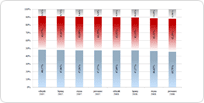Hakom - Croatian Post and Electronic Communications Agency
e-Agency
Users:
Cost Estimator
The Holder of Framework Programme
GIS portal
Privacy calculator
Application ''Quiz''
Market survey
Ordinance on amendments to the Ordinance on number portability enters into force on 11 August 2016
NEWSThese amendments regulate in more detail the manner of calculation and the amount of fees for delayed number porting.
ZAGREB, 8 August 2016 – The Croatian Regulatory Authority for Network Industries (HAKOM) announces the publication of the Ordinance on amendment to the Ordinance on number portability (OG No. 71/16). These amendments regulate in more detail the manner of calculation and the amount of fees for delayed number porting. The above-mentioned amendment lays down more clearly the receiving operator’s right to a fee for delayed porting by the donor operator.
The Ordinance on amendment to the Ordinance on number portability enters into force on 11 August 2016 and is available at this link .
# # #
For additional information please contact:
Croatian Regulatory Authority for Network Industries (HAKOM)
Roberta Frangeša Mihanovića 9
10110 Zagreb, Croatia
Tel. + 385 (0) 1 700 70 07
Fax + 385 (0)1 700 70 70
Media inquiries can be submitted online using HAKOM’s official website:
Registration required.
ABOUT HAKOM: HAKOM (www.hakom.hr) - Croatian Regulatory Authority for Network Industries – ensures preconditions for a fair market competition, stable growth and environment for innovations in the electronic communications and postal services market. HAKOM protects users’ interests and the possibility of choice among various communications and postal services at affordable prices, defines sustainable competitive conditions for operators and service providers under fair conditions for return on investment, and provides support to economic growth, public services and the quality of life in the Republic of Croatia by using modern technologies. HAKOM’ strategic goals are: to promote regulation of the electronic communications and postal services market, to support growth of investments and innovations in the electronic communications and postal services market, to provide efficient use of limited resources, to accelerate the growth of broadband products and services, to provide affordable offers of communications and postal services, to provide protection and informing of users, to build an efficient and comprehensive information system, to define and implement efficient processes, and to acquire multi-disciplinary competencies in market regulation.












